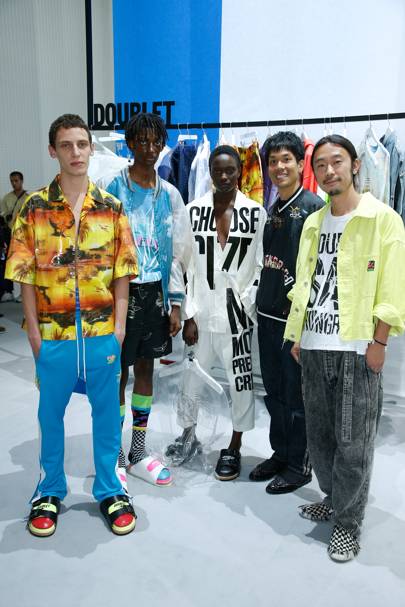Such an ominous endeavor can perhaps only be made more so by the introduction of a rigid language barrier – so, “it was a surprise to win!” remarked Japanese designer Masayuki Ino whose brand, Doublet, was awarded the grand prize of €300,000 alongside a year’s LVMH mentoring. The first non-European based designer to win the award, Ino’s innovative formats – he compacts his T-shirts into parcels so small that they can be packaged within ramen pots, requiring you simply add water to grow them to full size – earned him enthusiastic fans among the panel. “He has a novel way of approaching things, and he almost feels like a new Issey Miyake in the ways in which he treats fabrics and his clothes unfold,” explained Waight-Keller. “Even through the language barrier, he really manages to get his ideas, and his passion, across.”
“It felt new,” continued Jonathan Anderson. “In Japan, they have this amazing knowledge of textiles, and they want to try and do things that are novel – and Doublet felt new, it felt different. For me, what really sold it was seeing a clothing hanger which was actually a compressed shirt covered with a plastic garment bag. You could see that in the Met, and I wanted to buy it.”
While Doublet might be less established in Europe than his contemporaries – he only has one stockist in the UK, Dover Street Market – Ino is only just classified as a young designer by the LVMH standards: he is 39 years old (the cut-off is 40); his brand has been going for six years; and he previously worked for seven under Mihara Yasuhiro. His designs combine the staples of Japanese streetwear with the sort of remarkable fabrications only discovered with experience: one souvenir jacket he presented had been decorated with the best holographic tiger I’ve ever seen; the aforementioned slogan Tees expand with the addition of water (“Doublet say hungry?” they read in a crinkled font); a slogan embroidered upon an 80s-style polo wonderfully peeled away into a rainbow fringe.

They are funny, too; he describes his work as “fashion with a sense of humour,” which speaks aptly to the placement of an oversized holographic crocodile that riffs on the Japanese fascination with the Lacoste icon, or “your brand name here” emblazoned down the arm of a jumper in allusion to the endurance of logomania. Such meta references will likely become one of this era’s defining trends, and Masayuki speaks to the ever-expanding demand for ironically, self-aware fashion. That being said, “Masuyaki is original,” continued Arnault. “He hasn’t taken his ideas from someone else, or from the past, and his approach is very unique. I’m also very happy that someone from Japan has won the prize for the first time: the competition is totally international, and Japan is such an important country for fashion.”
Besides recognising Ino’s innovation, what the decision signified was a conscious choice to expand the Eurocentric confines of these sorts of prizes, alongside a new openness to streetwear as a luxury category (elsewhere, Supreme won a CFDA award this week and Virgil Abloh will show his first collection for Louis Vuitton later this month – it seems the penny has finally dropped). “I really didn’t expect to win,” smiled Ino. “So I don’t know what I will do with the money… but it is an honour to receive the award.”

They are funny, too; he describes his work as “fashion with a sense of humour,” which speaks aptly to the placement of an oversized holographic crocodile that riffs on the Japanese fascination with the Lacoste icon, or “your brand name here” emblazoned down the arm of a jumper in allusion to the endurance of logomania. Such meta references will likely become one of this era’s defining trends, and Masayuki speaks to the ever-expanding demand for ironically, self-aware fashion. That being said, “Masuyaki is original,” continued Arnault. “He hasn’t taken his ideas from someone else, or from the past, and his approach is very unique. I’m also very happy that someone from Japan has won the prize for the first time: the competition is totally international, and Japan is such an important country for fashion.”
Besides recognising Ino’s innovation, what the decision signified was a conscious choice to expand the Eurocentric confines of these sorts of prizes, alongside a new openness to streetwear as a luxury category (elsewhere, Supreme won a CFDA award this week and Virgil Abloh will show his first collection for Louis Vuitton later this month – it seems the penny has finally dropped). “I really didn’t expect to win,” smiled Ino. “So I don’t know what I will do with the money… but it is an honour to receive the award.”
Elsewhere in the competition, Korea-born, US-raised, London-based designer Rok Hwang was awarded a special prize consisting of €150,000 and a year’s mentorship for his discreet vision of female elegance. A former employee of Phoebe Philo, Hwang might be far earlier in his career than Ino – he has only created three collections for his brand Rokh – but shows remarkable promise with the other side of the luxury market. “My business is at a very early stage, so I’m going to focus on growing my team and building my foundations,” he said. “But also… continue with my day-to-day work.” As Ino proves: slow and steady wins…

No comments:
Post a Comment